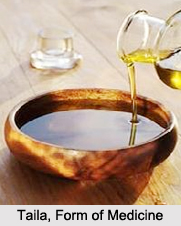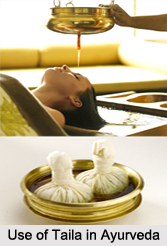 Tailas are medicated oil or decoctions of oil which are extensively used in almost all sorts of diseases. The oils are chiefly used externally and are rubbed on the body.
Tailas are medicated oil or decoctions of oil which are extensively used in almost all sorts of diseases. The oils are chiefly used externally and are rubbed on the body.
Preparation of Taila
Tailas are prepared by boiling vegetable drugs in oil, with the addition of water or other fluids such as Kanjika, milk or a decoction of drugs, etc. Castor oil and mustard oil are sometimes used in the preparation of medicated oils. As a general rule, the proportion of the different ingredients used is as follows:
Medicinal substances, in form of paste, 1 part, oil 4 parts, water or other menstruum 16 parts. When the fluids used are thick, such as decoctions or the expressed juice of vegetables, the proportion of solid paste is reduced from 1/4th to 1/6th and 1/8th respectively of the oil. Sometimes no solid paste is used at all.
If more than one variety of fluid is ordered, then up to four sorts the usual proportion of four of fluid to one of oil is observed, and these are boiled separately with each fluid; but, when the number of fluids exceeds four, each of the fluids ordered is taken in quantity equal to the oil and the whole are boiled together.
Preparation of Sesamum Oil
In preparing the Sesamum oil, before being boiled with medicinal substances is coloured and purified as follows:
 First of all it is heated to deprive it of any water that may be mixed with it; then the following substances are steeped in it for 24 hours, viz., madder 1/16th part in weight of the oil, turmeric, wood of Symplocos racemosa (lodhra), tubers of Cyperus rotundus (mustaka), a bark called nalika, the three myrobalans, root of Pavonia odorata (bala) and the tender shoots of Pandanus odoratissimus (ketaki), each 1/64th part in weight of the oil. These ingredients in fine powder should be soaked in the oil, with the addition of an equal quantity of water for a day. The mixture should then be boiled till the water is evaporated, and finally strained. To the oil thus prepared, medicinal substances, in the form of paste, decoction, etc., are added in the same proportions as for the preparation of "Ghritapaka". They are then boiled together till the watery parts are all evaporated. When cool, the oil is strained through cloth so as to separate the solid particles.
First of all it is heated to deprive it of any water that may be mixed with it; then the following substances are steeped in it for 24 hours, viz., madder 1/16th part in weight of the oil, turmeric, wood of Symplocos racemosa (lodhra), tubers of Cyperus rotundus (mustaka), a bark called nalika, the three myrobalans, root of Pavonia odorata (bala) and the tender shoots of Pandanus odoratissimus (ketaki), each 1/64th part in weight of the oil. These ingredients in fine powder should be soaked in the oil, with the addition of an equal quantity of water for a day. The mixture should then be boiled till the water is evaporated, and finally strained. To the oil thus prepared, medicinal substances, in the form of paste, decoction, etc., are added in the same proportions as for the preparation of "Ghritapaka". They are then boiled together till the watery parts are all evaporated. When cool, the oil is strained through cloth so as to separate the solid particles.
Some medicinal oils, and especially those used in the treatment of nervous diseases, rheumatism, etc., are subjected to a 3rd process of boiling with various aromatic and fragrant substances. This is called the "Gandhapaka" or boiling for rendering the oil fragrant. The following substances, or as many of them as are available, are used for scenting medicated oils, namely, cardamoms, cinnamon, cloves, fenugreek seeds, saffron, leaves of Cinnamomum Tamala, white sandal wood, aloes wood, jatamansi root, Curcuma Zedoaria (sati), Cyperus rotundus (mustaka), kakkola (an aromatic seed,) resin of Pinus longifolius (gandhaviraja), storax, long pepper root, root of Andropogon muricatus (usira), nakhi (Unguis odoratus), pouch of civet cat (khattdsi), camphor, musk, Permelia perlata (saileya), root of Aplotaxis auriculata (kushta), seeds of Abelmoschus moschatus (latakasturi), etc.
Related Articles
Charaka Samhita
Classification of Medicine by Charaka
Traditional Indian Medicines
Traditional Indian Medicine in Ancient Period
Ancient Hindu Medicine
Ancient Vedic Medicine Practitioners
Primitive Medicinal Practices in India
Kanjika
Dravaka




















